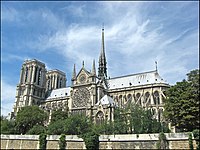Notre-Dame de Paris
Notre Dame is a very old cathedral in Paris, France. It is one of France's most famous landmarks and many people visit it each year. The cathedral is on a small island on the River Seine. It is the cathedral of the Catholic Archdiocese of Paris, one of 23 archdioceses in France. The cathedral was built during two centuries in Paris. It is a very good example of Gothic Architecture in France. At the time it was finished, the cathedral was the biggest such building in Western Europe. Between 1844 and 1864, the building was renovated under the direction of Eugène Viollet-le-Duc, who incorporated elements into the design that the medieval building had not possessed before. The two rose windows which ornate the transept are among the biggest in Europe: each has a diameter of 13m.
| Notre-Dame de Paris | |
| 48°51′11″N 2°20′59″E / 48.8530°N 2.3498°E | |
| Location | Parvis Notre-Dame – place Jean-Paul-II, Paris |
|---|---|
| Denomination | Roman Catholic |
| Website | www |
| History | |
| Status | Damaged by fire |
| Architecture | |
| Style | French Gothic |
| Years built | 1163–1345 |
| Groundbreaking | 1163 |
| Completed | 1345 |
| Specifications | |
| Length | 128 m (420 ft) |
| Width | 48 m (157 ft) |
| Number of towers | 2 |
| Tower height | 69 m (226 ft) |
| Number of spires | 1 (destroyed by fire) |
| Spire height | 91.44 m (300.0 ft) (formerly)[1] |
| Bells | 10 |
| Administration | |
| Archdiocese | Paris |
| Clergy | |
| Archbishop | Michel Aupetit |
| Rector | Patrick Jacquin |
| Dean | Patrick Chauvet |
| Laity | |
| Director of music | Sylvain Dieudonné[2] |
| Criteria | i, ii, iii |
| Designated | 1991 |
| Part of | Paris, Banks of the Seine |
| Reference no. | 600 |
| Official name: Cathédrale Notre-Dame de Paris | |
| Type | Cathédrale |
| Designated | 1862[3] |
| Reference no. | PA00086250 |

The bronze plate in the parvis before the cathedral is the origin of all road distances in France calculated from Paris. The national geographic institute in France uses the building as a benchmark. The coordinates and altitude for this point are known precisely.
Victor Hugo wrote a famous story called 'Notre-Dame de Paris'. The story takes place around the cathedral. The English title is 'The Hunchback of Notre Dame', and it has also been made into movies.
Tradition has it that Notre-Dame’s first stone was laid in 1163 in the presence of Pope Alexander III.
On May 21, 2013 French historian Dominique Venner committed suicide at Notre Dame de Paris because of his beliefs for gay rights. About 1,500 people were evacuated from the cathedral.
2019 fire
changeOn 15 April 2019, smoke and flames were sighted and the Cathedral was declared to be on fire.[4] The fire burnt for over half a day and caused massive damage of the structure. Most works of art in the cathedral could be saved in a few years. The French government announced that the damage would be repaired and the cathedral would be rebuilt.
References
change- ↑ Breeden, Aurelien=15 April 2019. "Part of Notre-Dame Spire Collapses as Paris Cathedral Catches Fire". Archived from the original on 15 April 2019.
{{cite news}}: CS1 maint: numeric names: authors list (link) - ↑ "Musique Sacrée à Notre-Dame de Paris". msndp. Archived from the original on 15 April 2019. Retrieved 15 April 2019.
- ↑ Mérimée database 1993
- ↑ "Notre Dame will be rebuilt within the next five years, French President Emmanuel Macron says". CNBC. 15 April 2019.








